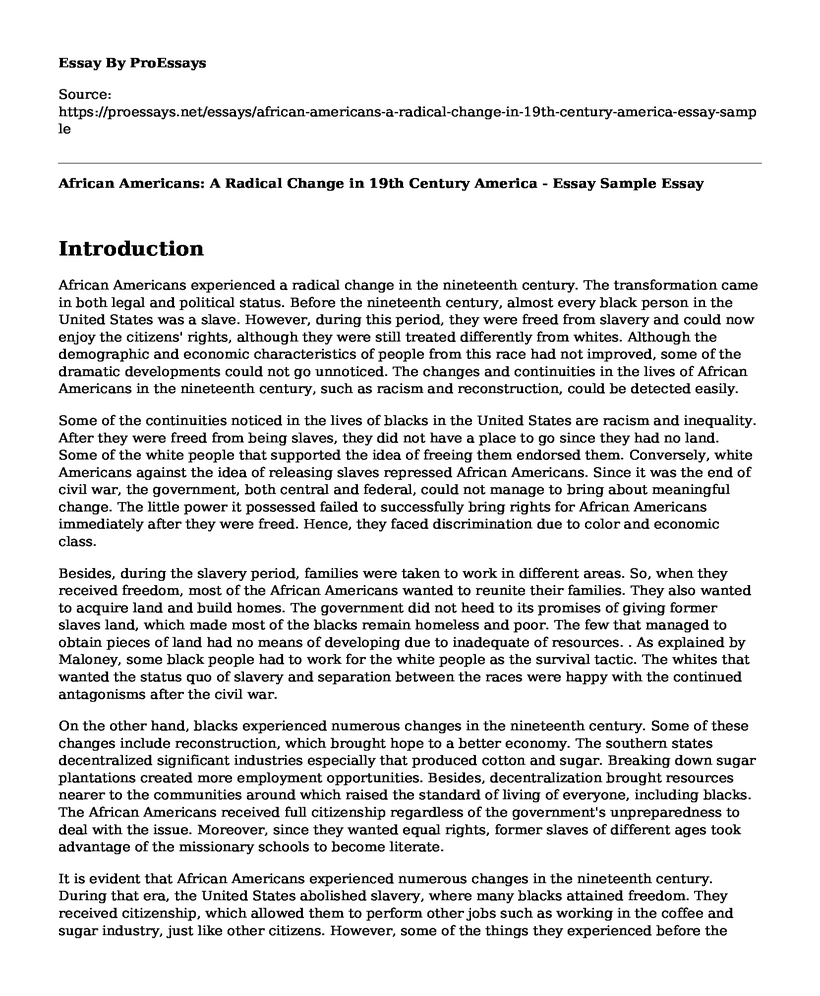Introduction
African Americans experienced a radical change in the nineteenth century. The transformation came in both legal and political status. Before the nineteenth century, almost every black person in the United States was a slave. However, during this period, they were freed from slavery and could now enjoy the citizens' rights, although they were still treated differently from whites. Although the demographic and economic characteristics of people from this race had not improved, some of the dramatic developments could not go unnoticed. The changes and continuities in the lives of African Americans in the nineteenth century, such as racism and reconstruction, could be detected easily.
Some of the continuities noticed in the lives of blacks in the United States are racism and inequality. After they were freed from being slaves, they did not have a place to go since they had no land. Some of the white people that supported the idea of freeing them endorsed them. Conversely, white Americans against the idea of releasing slaves repressed African Americans. Since it was the end of civil war, the government, both central and federal, could not manage to bring about meaningful change. The little power it possessed failed to successfully bring rights for African Americans immediately after they were freed. Hence, they faced discrimination due to color and economic class.
Besides, during the slavery period, families were taken to work in different areas. So, when they received freedom, most of the African Americans wanted to reunite their families. They also wanted to acquire land and build homes. The government did not heed to its promises of giving former slaves land, which made most of the blacks remain homeless and poor. The few that managed to obtain pieces of land had no means of developing due to inadequate of resources. . As explained by Maloney, some black people had to work for the white people as the survival tactic. The whites that wanted the status quo of slavery and separation between the races were happy with the continued antagonisms after the civil war.
On the other hand, blacks experienced numerous changes in the nineteenth century. Some of these changes include reconstruction, which brought hope to a better economy. The southern states decentralized significant industries especially that produced cotton and sugar. Breaking down sugar plantations created more employment opportunities. Besides, decentralization brought resources nearer to the communities around which raised the standard of living of everyone, including blacks. The African Americans received full citizenship regardless of the government's unpreparedness to deal with the issue. Moreover, since they wanted equal rights, former slaves of different ages took advantage of the missionary schools to become literate.
It is evident that African Americans experienced numerous changes in the nineteenth century. During that era, the United States abolished slavery, where many blacks attained freedom. They received citizenship, which allowed them to perform other jobs such as working in the coffee and sugar industry, just like other citizens. However, some of the things they experienced before the nineteenth century continued. These include racism and discrimination—some of the white Americans, especially those against abolishing slavery, oppressed blacks. Since the government did not honor the promises of giving former slaves land, some of them continued to be homeless and their families split. Nevertheless, these people were determined to obtain equal rights. Hence, they took all opportunities that came to their ways, such as education provided by missionaries.
Works Cited
Maloney N. Thomas. African Americans in the Twentieth Century. https://eh.net/encyclopedia/african-americans-in-the-twentieth-century/
Cite this page
African Americans: A Radical Change in 19th Century America - Essay Sample. (2023, Aug 01). Retrieved from https://proessays.net/essays/african-americans-a-radical-change-in-19th-century-america-essay-sample
If you are the original author of this essay and no longer wish to have it published on the ProEssays website, please click below to request its removal:
- International Human Relations: Human Trafficking Essay
- Gender and Identity in the Nickelodeon Television Show - Essay Sample
- Methamphetamine: An Illegal Drug Used For Recreational & Medical Purposes - Research Paper
- The Lowering of Confederate Symbols: Rejecting Hate & Discrimination - Essay Sample
- Essay Example on Sex Trafficking: Wider Than What We Perceive?
- Paper Example on 90% of US Struggling with Addiction: Refining Access to Treatment Services
- Essay Sample on Jim Crow Laws: Denying African Americans Their Rights







